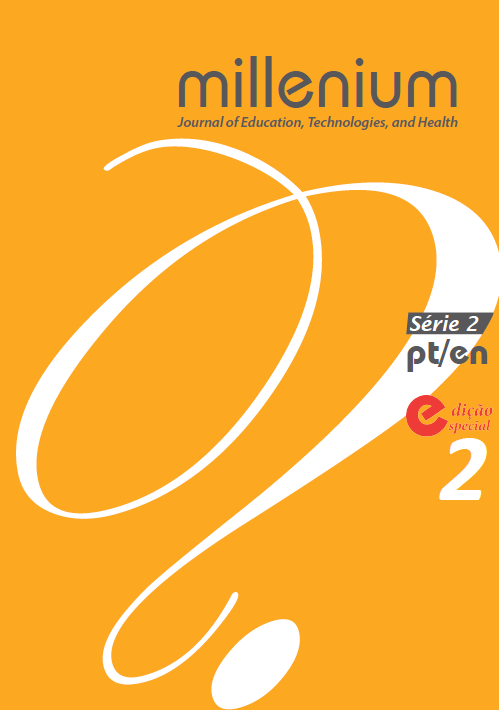Well-being in high school students
DOI:
https://doi.org/10.29352/mill0202e.02Keywords:
Bem- estar, Coping, Estudantes do Ensino Superior,Abstract
Introduction: The well-being is related with the way a person, generally, describes his/her life positively, in other words, the satisfaction a person shows regarding his/her life. When joining university, the student is exposed to several changes regarding what he/she was used to experience before. Those changes can contribute for his/her development, independence and autonomy process, and, in other way, represent inadequate and/or disturbing sensations. So, the university fitting process is complex and might potentially generate stress induction situations in several academic life’s moments.
Objectives: To evaluate university students well-being; Determine the effect of coping in students’ well-being.
Methods: Descriptive study with transversal focus. The sample is composed by 174 university students, being 82,8% feminine gender. The data gathering was obtained by the online filling of the following instruments: Positive and Negative Afect Schedule (PANAS), portuguese version from Galinha & Pais Ribeiro (2005), Scale de Brief – Cope Portuguese version from Pais Ribeiro & Rodrigues (2004).
Results: University students show more positive affection being by a minimum of 13 and a maximum of 50, with the mean value of M = 30.79, suggestive of subjective well-being. For negative affection, the minimum is -10 and the maximum of 35, being M=15,68. Regarding global subjective well-being, minimum is -8 and maximum 38, with (M= 15,11±9,058) which indicates that university students show more positive affection. The positive affection predictor variable was the positive reinterpretation, explaining 15,5% of the variation, being the explained adjusted variance of 15,0%. The older students (≥23 years old) show more positive aspects, showing that age interferes in the subjective well-being of the sample.
Conclusions: University students show more positive affection. The positive reinterpretation is a predictor in positive affection, the behavioral divestment; denial and substance abuse are negative affection predictors. The subjective well-being predictors are: active coping, behavioral divestment, self-blaming, positive reinterpretation and self-distraction, suggesting that coping predicts university students’ well-being, so these variables should be considered when planning pedagogical actions directed to them
Downloads
References
Carlotto, R. (2013). Adaptação Académica e Coping em Estudantes Universitários. Brazil.
Cipe Versão 2 - Classificação Internacional Para A Prática De Enfermagem. (2011). Edição Portuguesa Ordem dos Enfermeiros.
Cunha. M. (Inves. Resp.).(2017). Projeto “Estratégias de Coping e Psicopatologia em Estudantes e Profissionais de Saúde: Perspetiva Ibérica (CPEPibérico), (Refª: PROJ/CI&DETS/ 0031.) CI&DETS, IPV.
Dicionário da Língua Portuguesa . (1998).
Ferreira, E. (2014). Ansiedade aos Exames em estudantes Universitários: Relação com stress académico, estratégias de coping e Satisfação académica. Lisboa, Portugal.
Figueira, C. (2013). Bem-Estar nos Estudantes do Ensino Superior: Papel das Exigências e Dos Recursos Percebidos no Contexto Académico e das Atividades de Voluntariado (Tese de Doutoramento). Lisboa : Universidade de Lisboa .
Galinha, I. C., & Pais-Ribeiro, J. L. (2005). Contribuição para o estudo da versão portuguesa da Positive and Negative Affect Schedule (PANAS): II - Estudo Psicométrico. Análise Psicológica, pp. 219-227.
Lopes, J. (2015). Bem-Estar Psicológico Em Estudantes Do Ensino Superior Relação com as Variáveis Sociodemográficas, Pessoais e Académicas. Évora: (Tese de Doutoramento) .
Monteiro, S. (2008). Optimismo e Vinculação na Transição para o Ensino Superior: Relação com a Sintomatologia Psicopatológica , Bem - Estar e Rendimento Académico. Tese de Doutoramento: Universidade de Aveiro .
Pais-Ribeiro, J. L. (2012). Felicidade, bem-estar, qualidade de vida e saúde. Psicologia na Atualidade , 8, 22-31 .
Pais-Ribeiro, J. L. & Rodrigues, A:P: (2004). Questões acerca do coping: A propósito do estudo de adaptação do Brief Cope. ). Psicologia, Saúde & Doenças, 5(1), 3-15.
Silva, N. (2014). Ruído Hospitalar: Implicações no Bem- Estar do Doente (Tese de Mestrado) . Viseu.
Downloads
Published
How to Cite
Issue
Section
License
Copyright (c) 2017 Millenium - Journal of Education, Technologies, and Health

This work is licensed under a Creative Commons Attribution 4.0 International License.
Authors who submit proposals for this journal agree to the following terms:
a) Articles are published under the Licença Creative Commons (CC BY 4.0), in full open-access, without any cost or fees of any kind to the author or the reader;
b) The authors retain copyright and grant the journal right of first publication, allowing the free sharing of work, provided it is correctly attributed the authorship and initial publication in this journal;
c) The authors are permitted to take on additional contracts separately for non-exclusive distribution of the version of the work published in this journal (eg, post it to an institutional repository or as a book), with an acknowledgment of its initial publication in this journal;
d) Authors are permitted and encouraged to publish and distribute their work online (eg, in institutional repositories or on their website) as it can lead to productive exchanges, as well as increase the impact and citation of published work
Documents required for submission
Article template (Editable format)





